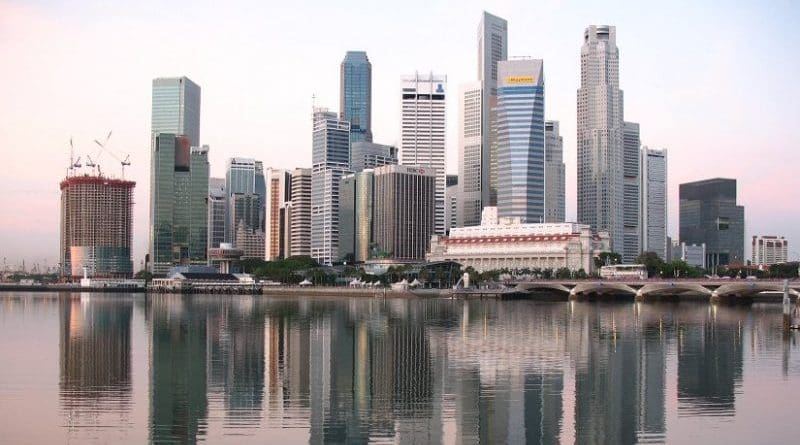Singapore-Malaysia Relations: Future Prospects – Analysis
By RSIS
Singapore-Malaysia relations have reached the best-ever period in their history. While the current generation of leaders has helped to improve relations institutional norms of diplomacy and mutual respect for each other’s interests are necessary to ensure strengthening of bilateral ties.
By David Han*
In his National Day Rally speech on 21 August 2016 Singapore Prime Minister Lee Hsien Loong mentioned that although Singapore-Malaysia relations are “sensitive” and “complex”, ties between both countries remain good. He cited the settlement of the Points of Agreement (POA) on the Railway land with his Malaysian counterpart Prime Minister Najib Razak and the signing of the Memorandum (MOU) on the High Speed Railway as examples of excellent relations between both countries.
These positive developments symbolise the marked improvement of bilateral ties since 2003. Indeed, strong political will and a new generation of leaders who are not weighed down by historical baggage have led to the best-ever period in the history of Singapore-Malaysia relations. While top leadership and personalities play a major role in shaping bilateral ties, established institutional norms of diplomacy and mutual respect for each other’s interests are necessary to ensure the continued improvement of bilateral ties.
Improved Relations and Uncertainties
After a painful separation in 1965, bilateral relations have experienced multiple ups and downs because of complicated differences in political ideologies and approaches to handling communalism. Singapore-Malaysia ties reached its lowest point during the second half of the premiership of Dr Mahathir Mohamad. Throughout the 1990s and early 2000s, both countries had many unresolved issues, such as the Pedra Branca dispute, the impasse on the implementation of the POA, the problems over the Central Provident Funds (CPF) of Malaysians, Johor water agreements, and the construction of a “scenic bridge” to replace the Causeway.
Remarkably, many of these long-standing bones of contention were swiftly and amicably resolved during the leaderships of Abdullah Badawi of Malaysia and Goh Chok Tong of Singapore, and subsequently during the tenures of their successors, Najib Razak and Lee Hsien Loong. The new generation leadership have come to realise that bilateral ties should not be held back by historical legacies.
Many observers of Singapore-Malaysia relations have highlighted that the change in political leadership from Dr Mahathir to Abdullah Badawi had fundamentally altered Malaysia’s foreign policy towards Singapore. In contrast to Dr Mahathir, Badawi and Najib presented a more moderate and pragmatic posture in their foreign policy approach towards Singapore. Consequently, such a posture helped to warm bilateral ties.
As changes in political leadership have been paramount in enabling bilateral ties to progress positively, some concerns have been raised whether this period of good relations would outlast the current leaders. Factors such as drastic changes in the domestic political scene, religious and political radicalisation, and deeply embedded ethnic sensitivities could derail bilateral ties.
Optimistic Future
In spite of such concerns on the future of Singapore-Malaysia relations, three mitigating factors could help continue the improvement of ties in the future. First, both countries can enhance the stability of bilateral engagements through closer observance of international norms and rules. Since the transition to the new generation of leaders on both sides of the causeway, foreign policy engagements have shifted away from dominance by strong personalities towards greater emphasis on established institutional norms of diplomacy and mechanisms of international law.
For example, through international arbitration, both countries were able to reach amicable settlements of the Pedra Branca disputes, the issue of land reclamation in the Straits of Johor, and development costs of the Malayan Railway land returned under the POA. As ties between both countries are increasingly normalised along institutional norms, this could reduce the possibility of dominating personalities steering bilateral ties in unpredictable ways as witnessed in the past.
Second, both countries must recognise and respect their different interests. Over the past 50 years, Singapore and Malaysia have taken decidedly different paths in their national development, both in political ideologies and management of ethnic issues. It would be unrealistic for each side to demand changes in the domestic and foreign policies of the other.
Some observers have argued that the differences in the foreign policies of Singapore and Malaysia have made it difficult to resolve past bones of contention. For example, it is commonly perceived that Malaysia’s foreign policy tends to emphasise flexibility and accommodation when necessary in its relations with other countries. Singapore’s foreign policy, on the other hand, focuses strongly on observance of international law and rules to ensure predictability in agreements and treaties with other countries.
Commonalities for Stronger Ties
However, there are important commonalities in the foreign policies of both countries. Malaysia’s foreign policy is built upon principles and pragmatism centred on international law, which converges with Singapore’s own foreign policy emphasis on observing international norms and laws. In addition, Singapore and Malaysia are co-members of ASEAN.
They share common ASEAN norms of multilateralism, particularly that of peaceful co-existence and consensus-based diplomacy. If both countries could focus on these similarities, it would help to forge common ground to resolve disputes which could arise in the future.
Thirdly, both Singapore and Malaysia have greater mutual interests at stake, particularly in the economic sphere. In ASEAN, Singapore is Malaysia’s largest trading partner, and Singapore has made significant economic ventures with Malaysia in areas such as the Iskandar Development Region. By strengthening economic cooperation, this would promote the “prosper thy neighbour” mentality, and reinforce the close and symbiotic relations of both nations.
These approaches by no means ensure that no disputes will ever arise again between Singapore and Malaysia. The key is how such disputes are resolved. Indeed, the foreign policies of both countries are still largely elite-driven. As such, rational political leadership is required to ensure that bilateral relations are premised on recognising the differences between both countries, and their willingness to co-exist peacefully through observance of rules-based interactions.
*David Han is a Research Analyst with the Malaysia Programme at the S. Rajaratnam School of International Studies (RSIS), Nanyang Technological University, Singapore.

